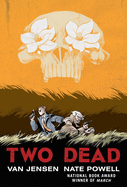
Cycles of violence dominate the graphic novel Two Dead--whether at home or on so-called enemy territory. Traumatized by a World War II friendly-fire fatality, Sergeant Gideon Kemp returns stateside, eschews his law degree and begins his police career in 1946 in his hometown of Little Rock, Ark. He's asked by the city's higher-ups--including the mayor and a councilman--to combat the Mafia's chokehold while keeping an eye on police chief Abraham Bailey, whose unorthodox practices have the power elite on tenterhooks. Thrown together, often in the same dangerously speeding squad car, both men wrestle personal demons potentially more threatening than the escalating crime. Meanwhile, on the other side of the segregated city, two African American brothers, Jacob and Esau, must choose between preserving their family bond or upholding the law: one is a decorated veteran facing the same blatant racism he had hoped to escape after valiantly serving his country, the other a hardened criminal who readily flaunts safety for the promise of illicit rewards.
"Two Dead is a work of fiction but one inspired by truths... its tragic events are largely factual," writer Van Jensen notes in his afterword. As a former Arkansas Democrat-Gazette crime reporter, Jensen's access to true stories guides his narrative, "brought to life" by National Book Award-winning artist Nate Powell (March series). As Jensen reveals history, Powell's strikingly dynamic style proves ideal for enhancing action as commonplace as lighting a match, as riveting as a middle-of-the-night chase that goes off track. With effecting resonance, both artist and author show and tell how, despite the book's 70-plus-years timestamp, inhumane brutality caused by war, racism and those in power--especially the police--is no relic of the past. --Terry Hong, Smithsonian BookDragon

